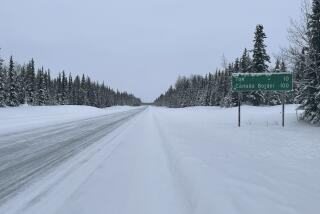Op-Ed: Tune out cable news and turn away fear
I miss the days when people would say “Bon voyage” to travelers heading off. Today, Americans instead say “Travel safely.”
I travel a lot. In the last year or so I’ve been to Egypt, the West Bank, Israel, Turkey and Russia. My loved ones worry out loud: “Rick, do you think this is safe?” I always assure them, “As long as I’m not traveling through Chicago, I think I’ll be OK.”
After traveling and lecturing across the United States in recent months, it strikes me that our nation has never been so racked with fear. The paramount concern is “national security”: the fear that apocalyptic forces outside America’s borders — Islamic State, Ebola, immigrants from Latin America — will creep in and overwhelm us.
But the more I travel, the clearer it seems to me: Fear is for people who don’t get out much. These people don’t see the world firsthand, so their opinions end up being shaped by sensationalistic media coverage geared toward selling ads. Sadly, fear-mongering politicians desperate for your vote pile on too.
Commercial television news is hammering “the land of the brave” with scare tactics as never before. I believe the motivation is not to make us safer. It’s to boost ratings to keep advertisers satisfied and turn a profit.
When Walter Cronkite closed the evening news by saying, “And that’s the way it is,” I believe that, to the best of journalists’ knowledge, that really was the way it was. In those days, television networks were willing to lose money on their evening news time slot to bring us the news. It was seen as their patriotic duty as good corporate citizens.
But times have changed, and now corporations have a legal responsibility to maximize short-term profits for their shareholders. They’ve started sexing up, spicing up and bloodying up the news to boost ratings. And 24/7 news channels have to amp up the shrillness to make recycled news exciting enough to watch.
In a sense, news has become entertainment masquerading as news. Now an event is not news, it’s a “crisis.” Today it’s Islamic State militants and Ebola. Last month, the greatest threat to civilization was apparently the National Football League turning a blind eye to domestic violence. Or was it racist cops? Or child immigrants at the Mexican border? Of course, these are serious issues. But hyping a news story as a “crisis” and lurching erratically from one to the next serves only to stir people up. Mix in negative political ads, and it can feel as if the world is falling apart.
The unhappy consequence: We end up being afraid of things we shouldn’t be — and ignoring things that actually do threaten our society, such as climate change and the growing gap between rich and poor.
It seems that the most fearful people in our country are those who don’t travel and are metaphorically barricaded in America. If we all stayed home and built more walls and fewer bridges between us and the rest of the world, eventually we would have something to actually be fearful of.
I’ve found that one partial solution is a simple one: travel.
The flip side of fear is understanding. And we gain understanding through travel. As you travel, you realize that we’re just 300 million Americans in a much wider pool of 7 billion people. It’s good for our national security to travel, to engage with the other 96% of humanity and gain empathy for people beyond our borders.
Don’t let fear-mongering politicians and ratings-crazed news channels shape the way you see our world. Get out there and experience it for yourself. Bon voyage.
Rick Steves writes travel guidebooks and hosts the public television series “Rick Steves’ Europe.” The new edition of his book “Travel as a Political Act” is out this month.
Follow the Opinion section on Twitter @latimesopinion
More to Read
Sign up for Essential California
The most important California stories and recommendations in your inbox every morning.
You may occasionally receive promotional content from the Los Angeles Times.










